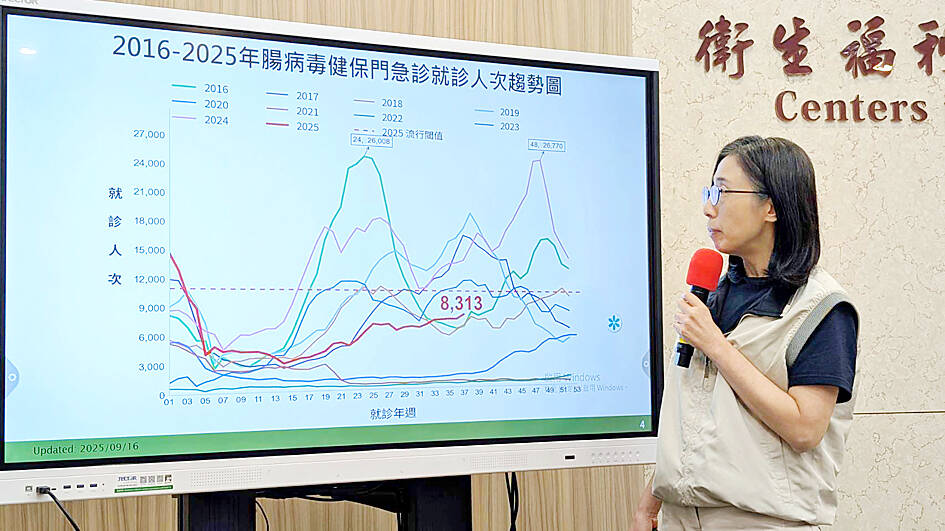The Centers for Disease Control (CDC) yesterday reported the death of a newborn from severe enterovirus infection, bringing the total number of deaths this year to eight, the most in six years.
CDC Deputy Director-General and spokesperson Tseng Shu-hui (曾淑慧) said the newborn developed symptoms including low body temperature and jaundice seven days after birth and was rushed to an emergency room.
He was found to have sepsis-like symptoms, including a low blood platelet count and metabolic acidosis, at the emergency room, so he was admitted to an intensive care unit for further treatment, she said.

Photo: CNA
Despite treatment, the infant’s condition did not improve, and he died the following day. Tests later confirmed infection with echovirus 11, Tseng said.
Sixteen severe enterovirus cases have been reported this year, eight of which were fatal, the highest toll for the same period in six years, she said.
CDC Epidemic Intelligence Center Deputy Director Lee Chia-lin (李佳琳) said there were 8,313 hospital visits for enterovirus last week, a 7 percent increase from the previous week. Although cases have been rising gradually in the past few weeks, the number has not yet reached the threshold for an epidemic, she said.
Viral surveillance data show that Coxsackievirus A16 has been the dominant strain circulating locally over the past four weeks, followed by echovirus 11 and Coxsackievirus A6, she said.
Tsend said that with schools reopening, the risk of viral transmission has increased, adding that case numbers in some regions have already reached more than 80 percent of their respective epidemic thresholds.
The CDC predicts that enterovirus infections could reach epidemic levels as early as next month, she said.
CDC physician Lin Yung-ching (林詠青) said echovirus 11 can cause severe, life-threatening illness in newborns, so expectant mothers are encouraged to pay more attention to their health condition before giving birth, avoid going to crowded or poorly ventilated venues and avoid contact with people with respiratory symptoms.
If expectant mothers develop cold-like symptoms within two weeks before giving birth, they should inform their medical team so that special attention and care can be given to the newborn, he added.
Meanwhile, Lee said four imported cases of malaria were reported last week, including three people who traveled abroad between July and this month without taking preventive medication, while the fourth was a long-term resident of India.
Of the three travelers, two had visited Indonesia and were infected with Plasmodium vivax, which causes vivax malaria, Lee said.
Another had traveled through several African countries — including Tanzania, Uganda, Rwanda and Kenya — and contracted Plasmodium falciparum, which causes severe malaria, she said.
The case involving the long-term resident of India was confirmed as vivax malaria after they arrived in Taiwan late last month, she said.
Twenty malaria cases have been reported this year, including the four most recent, the highest number for the same period in 19 years, Lee said.
All of them were imported, she said.
The CDC urged travelers to malaria-endemic countries to visit a travel clinic at least one month before departure for consultations, continue taking prophylactic medication throughout their trip and seek immediate medical attention if they develop symptoms, and inform their doctor about their travel history.

The manufacture of the remaining 28 M1A2T Abrams tanks Taiwan purchased from the US has recently been completed, and they are expected to be delivered within the next one to two months, a source said yesterday. The Ministry of National Defense is arranging cargo ships to transport the tanks to Taiwan as soon as possible, said the source, who is familiar with the matter. The estimated arrival time ranges from late this month to early next month, the source said. The 28 Abrams tanks make up the third and final batch of a total of 108 tanks, valued at about NT$40.5 billion

Two Taiwanese prosecutors were questioned by Chinese security personnel at their hotel during a trip to China’s Henan Province this month, the Mainland Affairs Council (MAC) said yesterday. The officers had personal information on the prosecutors, including “when they were assigned to their posts, their work locations and job titles,” MAC Deputy Minister and spokesman Liang Wen-chieh (梁文傑) said. On top of asking about their agencies and positions, the officers also questioned the prosecutors about the Cross-Strait Joint Crime-Fighting and Judicial Mutual Assistance Agreement, a pact that serves as the framework for Taiwan-China cooperation on combating crime and providing judicial assistance, Liang

A group from the Taiwanese Designers in Australia association yesterday represented Taiwan at the Midsumma Pride March in Melbourne. The march, held in the St. Kilda suburb, is the city’s largest LGBTQIA+ parade and the flagship event of the annual Midsumma Festival. It attracted more than 45,000 spectators who supported the 400 groups and 10,000 marchers that participated this year, the association said. Taiwanese Designers said they organized a team to march for Taiwan this year, joining politicians, government agencies, professionals and community organizations in showing support for LGBTQIA+ people and diverse communities. As the first country in Asia to legalize same-sex

MOTIVES QUESTIONED The PLA considers Xi’s policies toward Taiwan to be driven by personal considerations rather than military assessment, the Epoch Times reports Chinese President Xi Jinping’s (習近平) latest purge of the Chinese People’s Liberation Army (PLA) leadership might have been prompted by the military’s opposition to plans of invading Taiwan, the Epoch Times said. The Chinese military opposes waging war against Taiwan by a large consensus, putting it at odds with Xi’s vision, the Falun Gong-affiliated daily said in a report on Thursday, citing anonymous sources with insight into the PLA’s inner workings. The opposition is not the opinion of a few generals, but a widely shared view among the PLA cadre, the Epoch Times cited them as saying. “Chinese forces know full well that